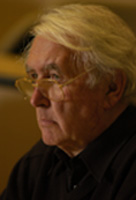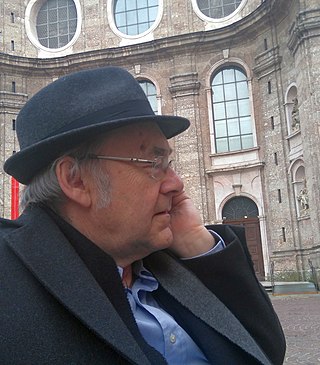
Ludwig Josef Johann Wittgenstein was an Austrian philosopher who worked primarily in logic, the philosophy of mathematics, the philosophy of mind, and the philosophy of language.

Friedrich Albert Moritz Schlick was a German philosopher, physicist, and the founding father of logical positivism and the Vienna Circle.

The Vienna Circle of logical empiricism was a group of elite philosophers and scientists drawn from the natural and social sciences, logic and mathematics who met regularly from 1924 to 1936 at the University of Vienna, chaired by Moritz Schlick. The Vienna Circle had a profound influence on 20th-century philosophy, especially philosophy of science and analytic philosophy.

Dewi Zephaniah Phillips, known as D. Z. Phillips or simply DZ, was a Welsh philosopher. He was a leading proponent of the Wittgensteinian philosophy of religion. He had an academic career spanning five decades, and at the time of his death he held the Danforth Chair in Philosophy of Religion at Claremont Graduate University, California, and was Professor Emeritus of Philosophy at Swansea University.
Friedrich Waismann was an Austrian mathematician, physicist, and philosopher. He is best known for being a member of the Vienna Circle and one of the key theorists in logical positivism.

Fritz Mauthner was an Austrian philosopher and author of novels, satires, reviews and journalistic works. He was an exponent of philosophical scepticism derived from a critique of human knowledge and of philosophy of language.

Peter Guy Winch was a British philosopher known for his contributions to the philosophy of social science, Wittgenstein scholarship, ethics, and the philosophy of religion. Winch is perhaps most famous for his early book, The Idea of a Social Science and its Relation to Philosophy (1958), an attack on positivism in the social sciences, drawing on the work of R. G. Collingwood and Ludwig Wittgenstein's later philosophy.

Kirchberg am Wechsel is a town in the district of Neunkirchen in the Austrian state of Lower Austria. It is notable for hosting the International Wittgenstein Symposium since 1976 and is the home of the Austrian Ludwig Wittgenstein Society.

Haus Wittgenstein is a house in the modernist style on the Kundmanngasse, Vienna, Austria. It "shows remarkably similar characteristics in its obsession with detail and complete disregard for the requirements of the people who are expected to live within it." The house was commissioned by Margaret Stonborough-Wittgenstein, who asked the architect Paul Engelmann to design a townhouse for her. Stonborough-Wittgenstein invited her brother, the philosopher Ludwig Wittgenstein, to help with the design. In the end, he became more author than helper.

Jerzy Perzanowski, was a Polish logician and ontologist, Professor of Logic to the University of Toruń (Poland) from 1992 to 2004. Founder of the Polish review Logic and Logical Philosophy, his main contributions are to the development of modal logic, paraconsistent logic and ontology.
In philosophy, Wittgenstein's ladder is a metaphor set out by Ludwig Wittgenstein about learning. In what may be a deliberate reference to Søren Kierkegaard's Concluding Unscientific Postscript to Philosophical Fragments, the penultimate proposition of the Tractatus Logico-Philosophicus reads:
6.54
My propositions serve as elucidations in the following way: anyone who understands me eventually recognizes them as nonsensical, when he has used them—as steps—to climb beyond them.
He must transcend these propositions, and then he will see the world aright.

Friedrich Stadler is an Austrian historian and philosopher and professor for history and philosophy of science at the University of Vienna. He is the founder and long-time director of the Institute Vienna Circle, which was established as a Department of the Faculty of Philosophy and Education of the Vienna University in May 2011. Currently he is a permanent fellow of this department and serves at the same time as the Director of the co-operating Vienna Circle Society, which is the continuation of the former Institute Vienna Circle as an extra-university institution.
Kristóf Nyíri, is a Hungarian philosopher. He is a member of HAS, was a guest at the University of Leipzig in the Winter Semester of 2006-2007 as Leibniz Professor, directed Communications in the 21st Century: The Mobile Information Society from 2001 to 2010, and is a Professor of Philosophy, in the Department of Technical Education, at Budapest University of Technology and Economics. He has written and edited more than 200 articles, chapters, reports and books.

Werner Leinfellner was professor of philosophy at the University of Nebraska–Lincoln and at the Vienna University of Technology. After recovering from life-threatening wounds during World War II, he studied chemistry and physics at the Universities of Vienna and Graz, eventually turning to the study of the philosophy of science, and receiving his Ph.D. in 1959. He moved to the United States in 1967, in part, because of problems faced by empirically oriented philosophers in obtaining academic positions in Austria and Germany. He is notable for his contributions to philosophy of science, as a member of European Academy of Sciences and Arts, for founding the journal Theory and Decision, for co-founding Theory and Decision Library, and for co-founding the Austrian Ludwig Wittgenstein Society and International Wittgenstein Symposium.
The International Wittgenstein Symposium is an international conference dedicated to the work of Ludwig Wittgenstein and its relationship to philosophy and science. It is sponsored by the Austrian Ludwig Wittgenstein Society.

Elisebeth Leinfellner was professor in linguistics at the University of Vienna, Department of Linguistics. She moved to the United States in 1967, and taught at Doane College in Crete, Nebraska, and at the University of Nebraska-Lincoln. She is notable for her contributions to linguistics and philosophy. She received the Austrian Grand Decoration of Honour for services to the province of Lower Austria for Science and Art. She co-founded the Austrian Ludwig Wittgenstein Society and International Wittgenstein Symposium.

Rudolph Krejci was a Czechoslovak-American philosopher and professor, who was the founder of the Philosophy and Humanities Programs at the University of Alaska Fairbanks, and founder and first dean of the university's College of Arts and Sciences in 1975. In 1997, after 37 years at the university, Krejci became Professor Emeritus of Philosophy and Humanities.
The Sekyra Foundation is a private foundation created in 2018 by Czech entrepreneur Luděk Sekyra in support of moral universalism, liberal values, and civil society. Among many other projects the Foundation has a long-term cooperation with the University of Oxford which has also named the oldest statutory professorship in philosophy at Oxford after the foundations founder Luděk Sekyra.

Josef Mitterer is an Austrian philosopher, and a retired professor at the University of Klagenfurt Department of Philosophy.
Walter Rudolf Schweidler is a German philosopher.














